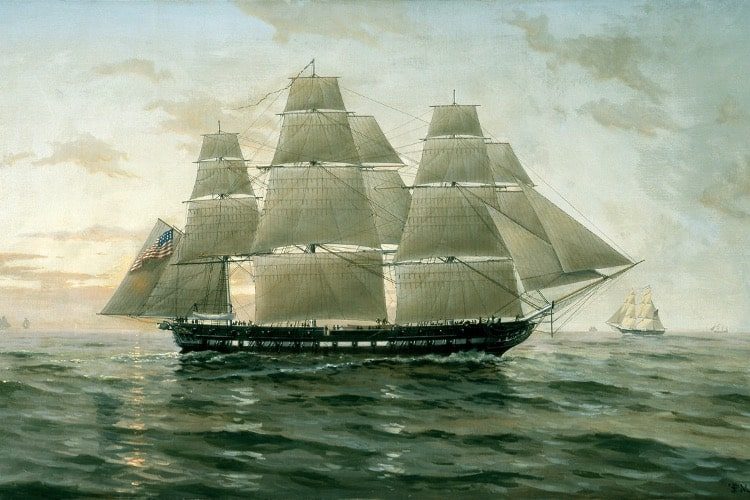
As the secretary of state serving under President Thomas Jefferson, James Madison realized that whether it was Great Britain, France, Spain, or any other nation of the Old World, the United States was looked upon as a child playing in a man’s game. This did not sit well with Madison, as he personally played an almost unparalleled role in the creation of the American confederation. Naturally, he was determined to see it afforded the same respect and regard as any other country. Madison would tirelessly endeavor to see the strength and equal footing of the United States affirmed diplomatically, and, should the country be attacked, America’s sovereignty and status would be supported militarily.
The strength of James Madison’s mettle regarding his affirmation of American strength and sovereignty would be tested once again when on June 22, 1807, a British naval vessel, the HMS Leopard, fired on an American supply ship, the USS Chesapeake, just off the coast of Norfolk, Virginia, killing three of her crewmen and injuring 18 more.
The commander of the Leopard, Captain Humphreys, boarded the Chesapeake, demanding permission to search for deserters. Commodore James Barron of the Chesapeake allowed the search, which proved fruitless. Humphreys returned to his ship, sounded a trumpet, and demanded that Barron surrender his ship. When Barron refused, Humphreys ordered gunners aboard the Leopard to fire a shot across the Chesapeake’s bow.
Following that symbolic volley, the Leopard fired all her guns into the side of the Chesapeake, disabling the frigate and killing or wounding nearly two dozen of the American crew serving on the ship. Barron was one of those killed in the unprovoked attack, but before he died, he struck his colors and surrendered the ship to Humphreys.
Humphreys then boarded the Chesapeake once again, whereupon he found and arrested four men sailing on the Chesapeake that he charged with having deserted from the British Navy. In the end, three of the four were proven to be American citizens. What’s more, two of the three Americans were Africans.
As Ralph Ketcham so rightly records in his biography of Madison regarding the Leopard’s attack on the Chesapeake, “If Britain condoned this act, or if the United States suffered it, American honor and independence meant nothing.”
It certainly meant something to the president, who was also the author of the Declaration of Independence, and to his secretary of state, who was the Father of the Constitution. Jefferson and Madison would not allow this injustice to go unavenged.
On July 2, 1807, President Jefferson called together his Cabinet and they issued a proclamation, the content and courage of which was almost completely from the mind of Madison. After rehearsing the “principles of peace” the United States had pursued with regard to its relations with the belligerent European powers, the statement made it clear why pacifism was no longer an option.
“At length a deed transcending all we have hitherto seen or suffered brings the public sensibility to a serious crisis and our forbearance to a necessary pause,” the proclamation declared.
Madison, the man behind the prose, then drove a stake into the ground, marking the limits of American patience and policy of peaceful avoidance of entanglements with Europe. “Hospitality under such circumstances ceases to be a duty.” The violence committed by the HMS Leopard had brought on “a rupture between the two nations,” the government of the United States explained.
Even still, however, Madison was a republican, and as such he abhorred war. He would not suffer humiliation, but he would not allow himself to advocate for armed response without a final attempt at a peaceful resolution, either. Therefore, the document signed in the name of President Thomas Jefferson and Secretary of State James Madison ordered all British ships out of American harbors and ordered Americans to cease trading with or supplying British ships.
On his own, Madison, under his authority as secretary of state, sent a letter to the U.S. Minister to the United Kingdom, James Monroe (written partially in code), informing him of the attack on the Chesapeake and the killing of her sailors:
The spirit which has been roused … pervades the whole community, is abolishing the distinctions of party; and, regarding only the indignity offered to the sovereignty and flag of the nation, and the blood of citizens so wantonly and wickedly shed, demands, in the loudest tone, an honorable reparation.
He then ordered Monroe that “the British Government is to be apprized of the importance of a full compliance with this expectation, to the thorough healing of the wound which has been made in the feelings of the American Nation.”
Madison concluded his letter to Monroe by telling him to assure the British that this pronouncement “is a measure not of reparation, but of precaution,” and if the British government fails to conform to the American demands for redress, “the answer will be obvious.”
Great Britain didn’t flinch, however, and the relationship between the two countries disintegrated further. In an effort to avoid war at all cost, Madison supported an embargo of British goods. This privation served only to punish Americans, who relied on the availability of British-manufactured items. Once again, the United States was treated by Europe as nothing more than a pawn to be dealt with or ignored as the circumstance provided.
Within fewer than two years, though, James Madison would be president, and his response would be in his own name, rather than that of Thomas Jefferson. As president, Madison’s courage and his “ardent and determined patriotism” would spur him to change the game, and forever after America would be a European pawn no more.



